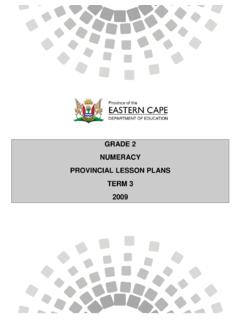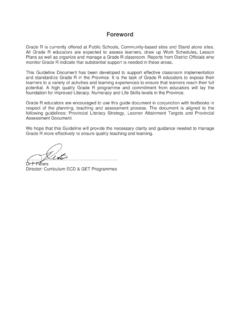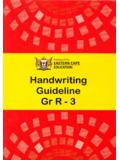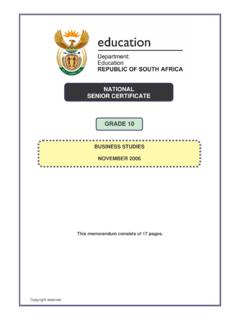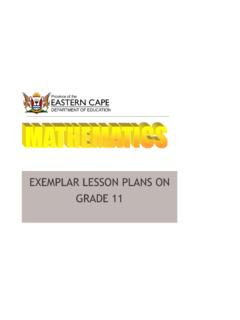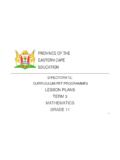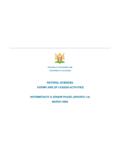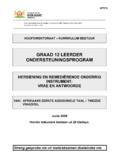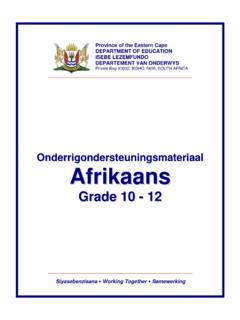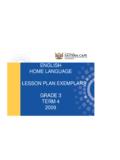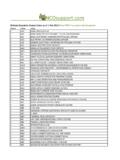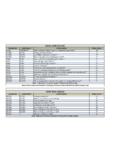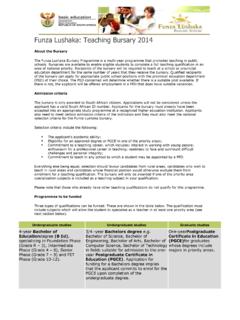Transcription of Province of the Eastern Cape DEPARTMENT OF EDUCATION …
1 Province of the Eastern cape DEPARTMENT OF EDUCATION ISEBE LEZEMFUNDO DEPARTMENT VAN ONDERWYS _____ PROVINCIAL ASSESSMENT GUIDELINES for ECONOMIC AND MANAGEMENT SCIENCES ( intermediate and senior phases ) 30 MAY 2007 PREFACE The Eastern cape DEPARTMENT of EDUCATION , Curriculum Chief Directorate in collaboration with the District Curriculum Personnel, Provincialised the National Assessment Guidelines for Economic and Management Sciences with the purpose of increasing the capacity of teachers to have a clear picture on the process of assessment in general and on continuous assessment in particular. This process has been informed by the Policy on Assessment of February 2007, National Assessment Guidelines of 2007, the Teacher s Resource Book for senior Phase of 2005 and Economic and Management Sciences Learning Area Statement Grade R - 9.
2 Critical engagement with the document is encouraged. We invite you to be as rigorous and as vigorous as you can and have complete faith in your professionalism as you implement the National Curriculum Statement (NCS) ii TABLE OF CONTENTS 1 INTRODUCTION .. 1 2 ASSESSMENT IN THE NATIONAL CURRICULUM STATEMENT .. 1 3 ECONOMIC AND MANAGEMENT SCIENCES EDUCATION AT A GLANCE IS: .. 1 4 KNOWLEDGE AND SKILLS INCLUDED IN THE ECONOMIC AND MANAGEMENT SCIENCES LEARNING OUTCOMES .. 2 5 WEIGHTING OF THE LEARNING OUTCOMES .. 3 6 INTEGRATION OF ASSESSMENT STANDARDS IN EMS .. 3 7 CONTINUOUS ASSESSMENT (CASS) IN EMS .. 3 Continuous assessment in Grades 4 - 4 Continuous And External Assessment: Grade 9.
3 4 Common Tasks for Assessment in Grade 9 (see page 36 National Curriculum Assessment Guidelines for EMS).. 5 Informal and Formal Assessment .. 5 Informal daily assessment and the implementation 5 Formal Assessment .. 6 8 PLANNING FORMAL ASSESSMENT TASKS .. 7 Planning for assessment in the Learning Programme .. 7 Planning for assessment in the Work Schedule Level .. 8 Planning for assessment in the Lesson Plan Level .. 8 Assessment Programme in EMS .. 8 9 MINIMUM REQUIREMENTS FOR EVIDENCE IN 9 Controlled Tests: .. 9 Simulation/Debate/ 9 Presentation .. 9 Assignment .. 10 Case Study .. 10 10 10 11 STAGES OF 11 12 MODUS OPERANDI.
4 11 LEVEL 1: SCHOOL LEVEL .. 11 LEVEL 2: CLUSTER/DISTRICT LEVEL .. 12 ROLE OF THE DCES 12 ROLE OF THE LEARNING AREA SPECIALIST (SES) .. 12 ROLE OF THE CLUSTER CHAIRPERSON (TEACHER).. 12 MODERATION PLAN .. 13 LEVEL 3: PROVINCIAL LEVEL .. 13 LEVEL 4: NATIONAL 13 CASS MODERATION 13 13 EXEMPLARS OF PROGRAMME OF ASSESSMENT - .. 14-25 14 ANNEXURES .. 26-38 1 1 INTRODUCTION This document serves to highlight issues on assessment in Economic and Management Sciences in the intermediate and senior Phase. Emphasis is on school based assessment. The document should be read in conjunction with Economic and Management Sciences National Assessment Guidelines.
5 Therefore the purpose of this document is not to repeat any part of the National Assessment Guidelines which are based on the assessment policy of February 2007 but merely to expand on issues not clearly stated yet crucial for micro planning of learner assessment. 2 ASSESSMENT IN THE NATIONAL CURRICULUM STATEMENT Assessment in the National Curriculum Statement is an integral part of teaching and learning and you should consider it carefully at all levels of planning. Assessment is a process of discovering information about learner s performance, using the information gathered to make a decision about the learner s performance and also about your teaching methods.
6 When planning for teaching and learning you need to choose a variety of teaching activities to achieve the various assessment standards. This will also lead to the achievement of the learning outcomes. To assess the activities you can also choose a variety of ways depending on what you want to find out from the assessment. Assessment should focus on applying the body of knowledge, skills and values acquired through learning and teaching. Assessment helps us to work out whether learners are performing according to their full potential and making progress towards the achievement of Learning Outcomes, as indicated in the Assessment Standards.
7 Assessment should achieve at least one of the following purposes: o Develop learner s knowledge, skills and values o Identify the needs of learners o Enable teachers to reflect on their practice o Identify learner s strengths and weaknesses o Provide additional support to learners o Revisit or revise certain sections where learners seem to have difficulties o Motivate and encourage learners o Provide information or data to a variety of stakeholders and o Demonstrate the effectiveness of the curriculum or a teaching strategy 3 ECONOMIC AND MANAGEMENT SCIENCES EDUCATION AT A GLANCE IS: EMS can be broken into the following, very broad categories of learning: o Economic Literacy o Financial Literacy 2 o Consumer Literacy o Entrepreneurial knowledge and skills o Managerial knowledge and skills and o Leadership knowledge and skills 4 KNOWLEDGE AND SKILLS INCLUDED IN THE ECONOMIC AND MANAGEMENT SCIENCES LEARNING OUTCOMES The knowledge and skills areas that are covered in the EMS Learning Outcomes are listed below.
8 O The role players in the economy - their roles, rights and responsibilities - and how the economy functions o Economic growth and development and how to sustain it o Productivity knowledge, values and attitude and its effect on economic prosperity, growth and living standards o Leadership and management issues within EMS include: Basic aspects of leadership, such as planning and directing Negotiation, motivation, delegation and conflict management Basic aspects of management such as administration, finance and production Marketing, purchasing, public relations and human resource development and Rights and responsibilities of management and workers o Financial and consumer knowledge in EMS includes: Accounting Personal finance Consumer knowledge and skill Importance of savings and investments o Entrepreneurial skills, knowledge and attitudes included in EMS include.
9 Taking initiative Risk taking within the context of the process of: Conceptualizing a business Financing a business Running a business o Responsibilities of entrepreneurs within communities and business environments. 3 5 WEIGHTING OF THE LEARNING OUTCOMES The following weightings are suggested for the intermediate and senior phases . Learning Outcomes intermediate Phase senior Phase LO 1 The economic cycle 20% 20% LO 2 Sustainable growth and development 20% 15% LO 3 Management, consumer and financial knowledge and skills 20% 30% LO 4 Entrepreneurial knowledge and skills 40% 35% The suggested weighting (time allocation ) per Learning Outcome is based on the actual time it would take to teach , learn and assess the appropriate knowledge , skills and values relating to the Learning Outcome in each phase.
10 Assessment in EMS focuses on the knowledge, skills and values necessary for informed, ethical, productive and responsible participation in the economy. Weighting shows the balance that should be maintained between the Learning Outcomes. You must assess all the Learning Outcomes and the learners must achieve the minimum standards in each of them. Weighting does not mean that one outcome is more important than the other. 6 INTEGRATION OF ASSESSMENT STANDARDS IN EMS Assessment Standard should be integrated where possible to enhance the process of teaching, learning and assessment. You can organize them as a unit, or design units that suit their context.
